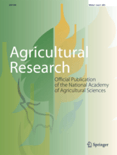
AGRICULTURAL RESEARCH
Scope & Guideline
Transforming agricultural practices through scholarly excellence.
Introduction
Aims and Scopes
- Sustainable Agriculture Practices:
Research focusing on environmentally friendly farming techniques, including organic farming, agroforestry, and conservation agriculture, aimed at improving crop yield while preserving natural resources. - Crop Improvement and Biotechnology:
Studies involving genetic enhancement, molecular breeding, and biotechnological applications to develop high-yielding and resilient crop varieties that can withstand abiotic and biotic stresses. - Soil and Water Management:
Research on soil health, fertility, and efficient water use practices, including irrigation management and soil conservation techniques, to optimize agricultural productivity. - Pest and Disease Management:
Investigations into integrated pest management strategies, biopesticides, and disease control to minimize crop losses and promote sustainable farming. - Climate Change and Agriculture:
Research assessing the impacts of climate change on agricultural systems and developing adaptive strategies to enhance resilience in farming practices. - Precision Agriculture Technologies:
Studies exploring the use of advanced technologies such as IoT, remote sensing, and machine learning to enhance agricultural productivity and resource efficiency. - Economic and Policy Analysis:
Research analyzing agricultural economics, market trends, and policy implications to support decision-making for farmers and stakeholders.
Trending and Emerging
- Digital Agriculture and Smart Farming:
An increase in research related to the application of digital technologies in agriculture, including IoT, machine learning, and data analytics to enhance farming efficiency and decision-making. - Climate Resilience and Adaptation Strategies:
Growing emphasis on developing agricultural practices and varieties that can withstand climate change impacts, including drought tolerance and resource-efficient farming. - Agroecology and Biodiversity Conservation:
A trend towards studying agroecological practices that promote biodiversity, soil health, and ecosystem services, reflecting a holistic approach to sustainable agriculture. - Nutritional Enhancement and Food Security:
Research focusing on biofortification and the nutritional quality of crops to combat malnutrition and enhance food security in vulnerable populations. - Integrated Pest Management (IPM) and Biopesticides:
An increasing number of studies are focusing on sustainable pest management strategies, particularly the use of biopesticides and ecological approaches to control pests. - Sustainable Water Resource Management:
Emerging research on innovative irrigation techniques and water use efficiency, particularly in arid and semi-arid regions, to address water scarcity in agriculture.
Declining or Waning
- Traditional Farming Practices:
Research on conventional farming methods has seen a decline, as there is a growing emphasis on modern, sustainable, and innovative agricultural practices that address current environmental challenges. - Chemical Fertilizers and Pesticides:
There is a noticeable reduction in studies focused solely on synthetic fertilizers and pesticides, reflecting a shift towards organic alternatives and integrated pest management strategies. - Livestock Production Systems:
Research centered on traditional livestock management practices is declining, likely due to the increasing focus on plant-based agriculture and sustainable animal husbandry practices. - Single Crop Systems:
Studies focusing solely on monoculture practices are waning, as there is a growing recognition of the benefits of crop diversification and intercropping systems for sustainability. - Local Knowledge and Traditional Techniques:
While still relevant, the focus on indigenous agricultural knowledge systems has diminished, as more emphasis is placed on scientific research and technological advancements in agriculture.
Similar Journals
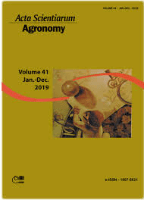
ACTA SCIENTIARUM-AGRONOMY
Innovating agronomy through groundbreaking research.ACTA SCIENTIARUM-AGRONOMY is a prestigious, peer-reviewed journal published by UNIV ESTADUAL MARINGA, PRO-REITORIA PESQUISA POS-GRADUACAO, focusing on advanced research in the field of agronomy and crop science. Since its inception as an Open Access journal in 2007, it has significantly contributed to disseminating high-quality research, allowing unrestricted access to its content for a global audience. Operating from Brazil, the journal holds a notable Q2 category ranking in Agronomy and Crop Science as of 2023, validating its importance within the academic community. The journal’s Scopus ranking positions it in the 49th percentile among Agricultural and Biological Sciences, indicating a robust foundation for impactful research. With a commitment to innovation and scientific excellence, ACTA SCIENTIARUM-AGRONOMY aims to provide researchers, professionals, and students with vital insights that drive forward our understanding of agriculture and its environmental implications.

Revista Brasileira de Ciencias Agrarias-Agraria
Empowering research in agricultural and biological sciences.Revista Brasileira de Ciencias Agrarias-Agraria is an esteemed academic journal published by the Universidade Federal Rural de Pernambuco, dedicated to advancing the field of agricultural and biological sciences. With a focus on disseminating high-quality research, this journal plays a pivotal role in fostering knowledge exchange within the agricultural community, particularly in Brazil and beyond. As a Q3 ranked publication in the Agricultural and Biological Sciences category, Revista Brasileira de Ciencias Agrarias-Agraria contributes to the growing body of literature by featuring insightful articles from both emerging and established researchers in the field. The journal has been consistently published since 2011 and is committed to open access principles, ensuring that research findings are accessible to a wide audience. Researchers, professionals, and students will find this journal an invaluable resource for deepening their understanding of current trends and innovations in agriculture.
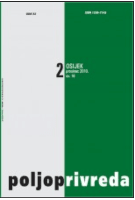
Poljoprivreda
Exploring the frontiers of agriculture since 2000.Poljoprivreda is a distinguished open-access journal dedicated to the field of agronomy and crop science, published by the FAC Agriculture Osijek in Croatia. Since its inception in 2000, the journal has been committed to disseminating high-quality research that informs both academic and practical advancements in agriculture. With an ISSN of 1330-7142 and an E-ISSN of 1848-8080, Poljoprivreda provides a vital platform for researchers, professionals, and students to engage with the latest findings and methodologies in agronomy, contributing significantly to the enhancement of agricultural practices in Croatia and beyond. Although currently ranked in the 22nd percentile within its category according to Scopus, the journal aspires to elevate its standing by welcoming innovative research that addresses contemporary challenges within the agricultural sciences. By fostering open access since 2000, Poljoprivreda ensures that its scholarly content is freely available, promoting wider dissemination and collaborative opportunities among researchers globally.

CABI Agriculture & Bioscience
Fostering impactful findings for a sustainable future.CABI Agriculture & Bioscience is an esteemed international journal published by SpringerNature, dedicated to advancing the fields of Agricultural and Biological Sciences, Animal Science, and Horticulture. With a strong focus on promoting Open Access research since 2020, this journal aims to disseminate scientific knowledge and innovative findings that contribute to sustainable agricultural practices and bioscience advancements. Situated in the United Kingdom, it has rapidly established itself as a premier platform, achieving impressive Q1 rankings in multiple categories, including Agricultural and Biological Sciences and Horticulture, as well as being among the top tier in Food Science. Its exceptional standing—reflected in its Scopus rankings, where it ranks in the 88th and 86th percentiles in key fields—underscores its importance to researchers, professionals, and students alike, fostering an environment for impactful collaboration and growth in the biosciences. By offering Open Access options, CABI Agriculture & Bioscience ensures that vital research is available to a broad audience, facilitating increased visibility and engagement within the global scientific community.
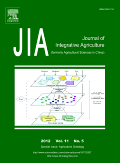
Journal of Integrative Agriculture
Advancing Agricultural Innovation Through Integrative ResearchJournal of Integrative Agriculture, published by Elsevier Science Ltd, stands as a leading platform for innovative research at the intersection of agricultural sciences. With a significant focus on integrative approaches, this journal has established itself within the academic community, reflecting its excellence through impressive Impact Factor rankings and a consistent Q1 category status in multiple fields, including Agronomy, Animal Science, and Ecology. The journal spans a wide range of topics, making it a critical resource for exploring advancements in Biochemistry, Food Science, and Plant Science. With its diverse Scopus rankings—from Rank #3 in Food Animals to Rank #14 in Animal Science—it serves as a vital repository for cutting-edge research that influences both scientific inquiry and practical applications in the agricultural domain. Operating from China and accessible through open access options, the Journal of Integrative Agriculture aims to foster collaborative research and knowledge exchange among scientists, professionals, and students worldwide, supporting the growth and sustainability of agricultural practices.

Journal of Agricultural Sciences-Tarim Bilimleri Dergisi
Nurturing Ideas, Growing Solutions in AgricultureJournal of Agricultural Sciences - Tarim Bilimleri Dergisi, published by Ankara University, Faculty of Agriculture, is a prominent open-access journal that has been fostering academic dialogue in the field of agricultural studies since 2010. With ISSN 1300-7580 and E-ISSN 2148-9297, this journal contributes significantly to the scientific community, particularly within the realms of agronomy, crop science, animal science, and plant science. As of 2023, it holds a Q3 classification in Agronomy and Crop Science, and Q4 in both Animal Science and Zoology and Plant Science, indicating its growing influence and dedication to advancing research in these areas. Situated in Turkey, this journal serves as a vital platform for scholars, professionals, and students, inviting submissions that enhance our understanding of agricultural innovation and sustainability. With a commitment to disseminating high-quality research, Journal of Agricultural Sciences ranks favorably within Scopus, providing an invaluable resource for exploring evolving agricultural paradigms.
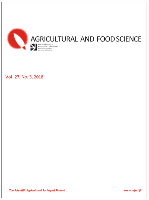
AGRICULTURAL AND FOOD SCIENCE
Advancing agricultural knowledge for a sustainable future.AGRICULTURAL AND FOOD SCIENCE is a prestigious journal published by the SCIENTIFIC AGRICULTURAL SOCIETY OF FINLAND, dedicated to advancing knowledge in the fields of agricultural and food sciences. With an ISSN of 1459-6067 and E-ISSN of 1795-1895, this open-access journal has been providing valuable insights and research findings since its inception in 2002. As of 2023, it holds a Q3 ranking in Food Science and is positioned at the 46th percentile within its Scopus category, ranking 210 out of 389 journals in Agricultural and Biological Sciences – Food Science. The journal features contributions from a global network of researchers, covering various topics including sustainable agricultural practices, food safety, and innovative food technologies. Based in Finland, the journal serves as an essential platform for scholars, professionals, and students who are committed to enhancing food security and agricultural productivity through rigorous scientific research. The convergence of interdisciplinary studies from 2004 to 2024 marks a critical evolution in the scope of agricultural and food research, making this journal a vital resource for anyone involved in these dynamic fields.

Journal of the ASABE
Connecting Experts to Innovate in Agriculture and BeyondJournal of the ASABE, published by the American Society of Agricultural and Biological Engineers, serves as a pivotal platform for disseminating cutting-edge research in various disciplines, including Agronomy, Crop Science, Biomedical Engineering, Food Science, Forestry, and Soil Science. With an impact factor that reflects its significance and reach, the journal ranks in the Q2 and Q3 quartiles across numerous categories in 2023, showcasing its commitment to advancing knowledge in agricultural and biological engineering. Authored by leading experts, the journal offers accessible articles on innovative methodologies, technologies, and sustainable practices essential to the global agricultural and environmental landscape. Open access options ensure that research findings are readily available to a broad audience, promoting collaboration and knowledge sharing among researchers, professionals, and students alike. With a strategic focus on research convergence into 2024, Journal of the ASABE is poised to shape the future of engineering solutions in agriculture and beyond.

Romanian Agricultural Research
Cultivating Knowledge, Harvesting InnovationsRomanian Agricultural Research is a prominent academic journal dedicated to advancing the field of agricultural science with a specific focus on agronomy and crop management. Published by the NATL AGRICULTURAL RESEARCH & DEVELOPMENT INST in Romania, this journal has established itself as an important resource within its discipline, evidenced by its Q3 ranking in the Agronomy and Crop Science category for 2023. With its ongoing publication since 2008, the journal provides a platform for researchers and professionals to disseminate their findings and share innovative practices that address the challenges faced in agricultural development. Although it operates under a non-open access model, Romanian Agricultural Research commits to rigorous peer-review processes, ensuring the high-quality content that enhances the academic community’s knowledge base. The journal's objective is to foster dialogues surrounding sustainable agriculture, improve crop yield, and contribute to the enhancement of agricultural practices globally. Researchers, professionals, and students will find this journal to be an invaluable repository of knowledge and a catalyst for future agricultural innovations.

AgriEngineering
Empowering Research for Enhanced Food Production SystemsAgriEngineering is a premier Open Access journal, published by MDPI, focusing on innovative research across the disciplines of agronomy, horticulture, food science, and engineering. Established in 2019 and headquartered in Basel, Switzerland, this journal has rapidly gained recognition, evidenced by its robust performance in the Scopus rankings and its positioning in Q1 and Q2 quartiles of key categories, including Horticulture and Agronomy. With a commitment to disseminating high-quality research that advances agricultural engineering practices, AgriEngineering provides a platform for researchers, professionals, and students to explore cutting-edge developments aimed at enhancing food production systems and sustainability. Its Open Access model ensures wide-reaching accessibility to vital research outcomes, empowering global collaboration and innovation in the field. For more information on submission and access, you can visit the AgriEngineering website.